5 Best Windows Parental Control Apps: Expert Tested in 2025
Windows’ built-in parental controls aren’t that comprehensive, so they’re not enough to keep your children fully protected online. However, finding a reliable parental control app is challenging, as you need a dedicated option with effective monitoring and reporting capabilities.
After extensive testing, I’ve found the best parental control apps for Windows. These parental controls offer tools like in-depth activity monitoring, thorough reporting, and screen time limiting to ensure your kids’ safety. Plus, they’re easy to set up and easily let you manage what your children are doing online.
Of my top choices, Qustodio is the #1 parental control app for Windows. Its in-depth web filtering, location tracking, screen time limiting, and routine scheduling make it the #1 choice. Plus, the 31-day trial and 30-day money-back guarantee let you try Qustodio without risk.
Safeguard your kids with Qustodio
Quick Guide: 5 Best Windows Parental Controls in 2025
- Qustodio — The #1 Windows parental control app offering one of the best web filters available.
- Mobicip — Comprehensive activity monitoring features, but it’s not the easiest to set up.
- Bark — Regularly monitors social media messages and flags anything suspicious, but it’s not the most feature-rich choice.
- Norton Family — Provides a highly intuitive dashboard but costs more than others.
- NetNanny — Comes with a useful alerting feature, but its interface is a little outdated.
The Best Parental Control Apps for Windows (Tested 2025)
1. Qustodio — The #1 Parental Control for Windows With Comprehensive Web Filtering
Key Features:
- Provides thorough web filtering to protect minors from inappropriate websites
- Offers screen time limits to ensure kids don’t spend too much time on their devices
- Has anti-tampering measures to keep children from uninstalling Qustodio
- Works on Windows 10 and 11
- Offers a 30-day money-back guarantee and 31-day free trial
Qustodio is the #1 parental control app for Windows, ensuring your kids are protected against various online threats and don’t spend too much time on their screens. Some of its key features on Windows include the following:
- Web filtering — blocks minors from accessing inappropriate websites, like gambling or adult content.
- Screen time limits — stops kids from using their devices too much or during school hours.
- Comprehensive monitoring — provides a full overview of your child’s online activities.
- Routines — offers a way to ensure children have a good balance of productive and free time.
- Location tracking — see where your kids are at all times for peace of mind.
Of all the app’s features, Qustodio’s web filtering stands out the most. It offers comprehensive filtering that lets you block entire categories of websites to keep minors from accessing them. Plus, there are extra tools like enhancing the safe search function and stopping the use of unsupported browsers with vulnerabilities.
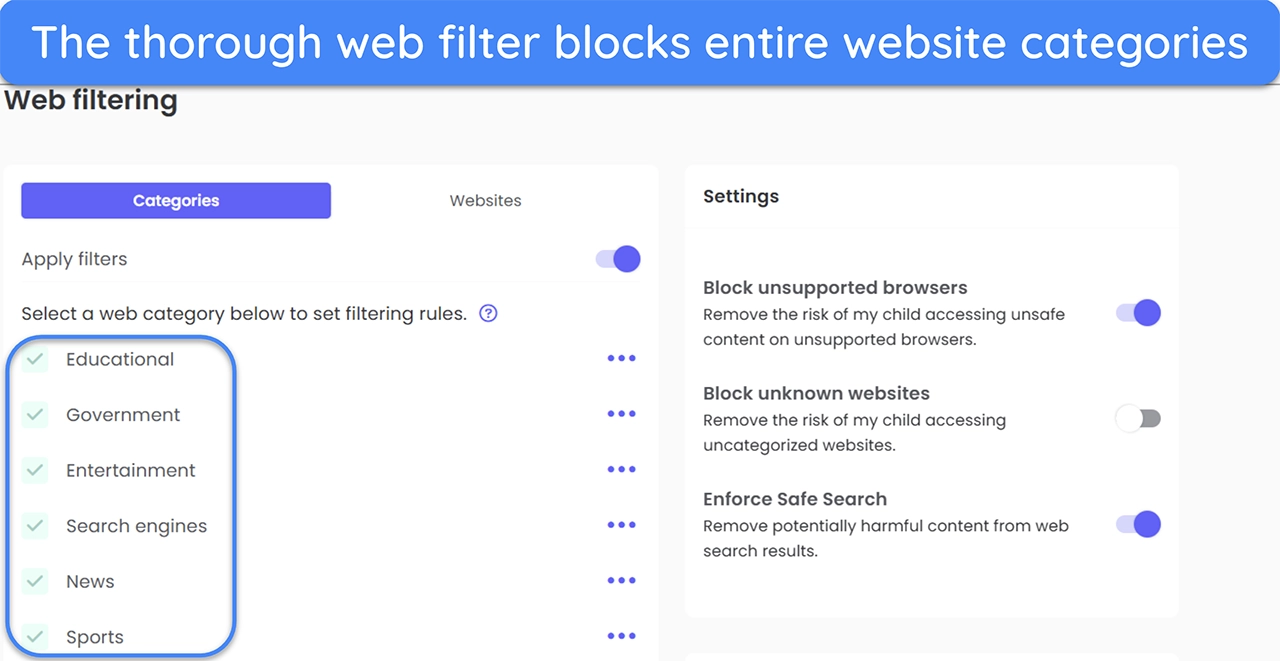
Another highlight is that Qustodio is really easy to use. The app’s simple setup makes it easy to configure on any of your kids’ devices. Plus, the intuitive dashboard ensures that you can easily monitor and manage activities from a single interface. Additionally, the app has anti-tampering to keep children from uninstalling Qustodio from their devices.
Qustodio’s cheapest Basic plan costs just $54.95/year, but you’ll get more features with the Complete plan, costing $99.95/year. Regardless of your choice, you’ll get a long time to try Qustodio without risk. The app comes with a 31-day free trial that lets you try all its premium features, and there’s a 30-day money-back guarantee that lets you get a refund if unsatisfied.
2. Mobicip — Offers In-Depth Monitoring Capabilities for Seeing Kids’ Activities
Key Features:
- Offers in-depth activity monitoring capabilities, including websites visited
- Delivers useful screen time limiting functionality to avoid excessive device time
- Has a dedicated YouTube monitoring feature
- Supports Windows 7, 8, 8.1, 10, and 11
- Has a 30-day money-back guarantee for its annual plans
Mobicip provides many features to help you see exactly what your children are doing. Its activity monitoring shows kids’ activity on their Windows devices, including all the websites they visit. Plus, the app offers dedicated YouTube monitoring that lets you check that your children aren’t watching anything unsafe on the popular video platform.
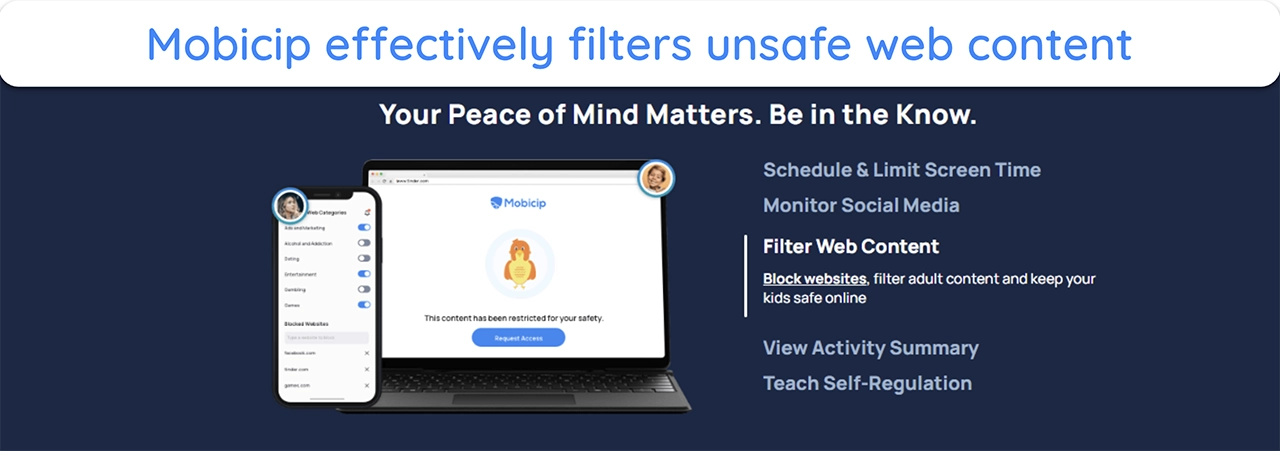
Mobicip also has other useful features for protecting kids who are using Windows devices:
- Schedules — ensure your children are following a set routine for screen and off-screen time.
- Screen time limits — prevent your children from overusing their devices.
- Social media monitoring — monitor conversations and activity across social media platforms.
- Activity summary — see a helpful summary of your child’s activity in the past few days.
While it’s not as easy to set up as Qustodio, Mobocip is fairly easy to use when it’s configured. The app for parents has a simple dashboard and lets you view your kids’ activity from your desktop computer or mobile device with a few taps or clicks.
Mobicip has several plans, with the cheapest Lite option costing just $35.88/year. However, you’ll need to get the most expensive Premium subscription if you want access to its social media monitoring. In either case, you can try Mobicip risk-free, as it comes with a 30-day money-back guarantee and a 7-day free trial.
3. Bark — Provides Extensive Social Media Activity Tracking
Key Features:
- Offers some of the best social media monitoring available
- Includes various web filtering categories to protect children from unsafe websites
- Regularly creates reports based on your child’s activity
- Works on Chrome and Microsoft Edge for Windows
- Includes a 7-day free trial
Bark is among the top parental controls if monitoring your kids’ social media is a priority. As soon as I started configuring the app, I could monitor social media and online communication apps like Instagram, Discord, Twitter/X, Steam, and Discord. This ensures you’re always aware of your childrens’ social media activity.
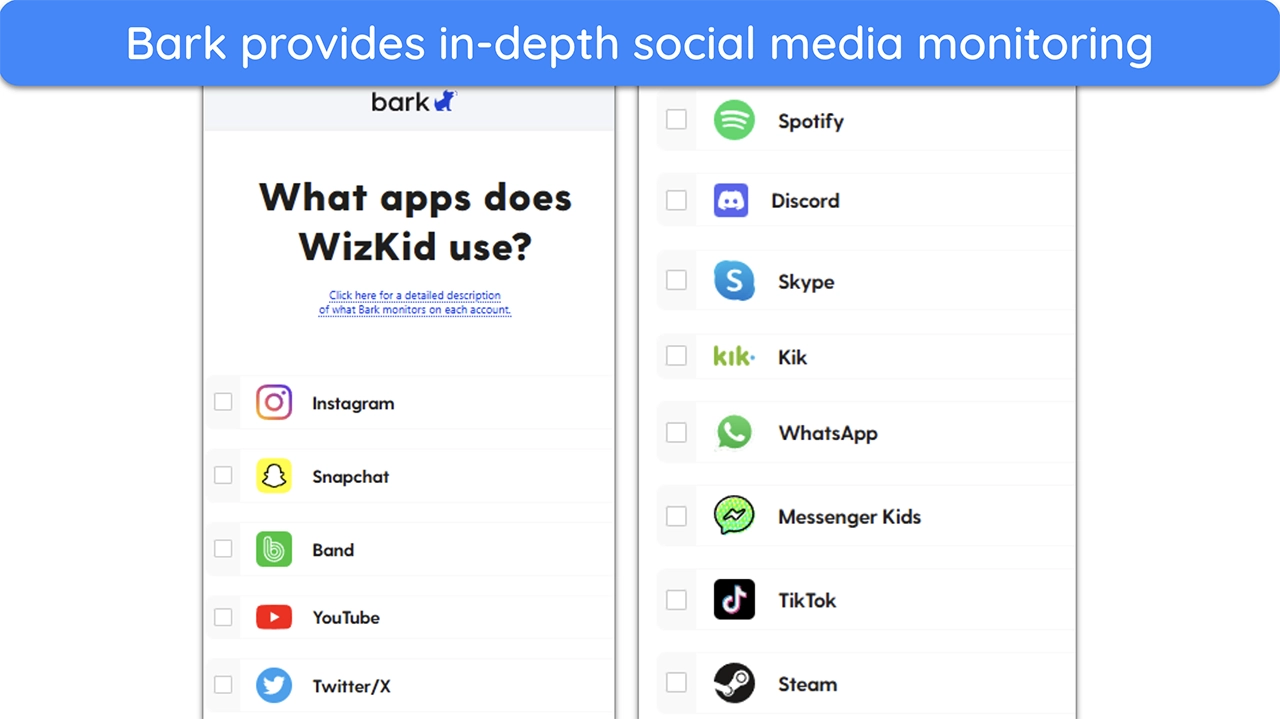
While it’s not the most feature-rich parental control for Windows, Bark also provides useful web filtering to safeguard your minors from unsafe websites. Its web filter includes multiple categories that you can block to ensure minors don’t access dangerous websites. Plus, it creates reports based on website metadata, page titles, web searches, and saved device data.
Note that Bark only works on Chrome or Edge for Microsoft Windows. It doesn’t have a native app, so it’s limited to the browser extensions and can’t monitor any activity outside the browsers.
Bark includes monthly and yearly subscriptions for its two plans — Bark Premium, and Bark Jr. Bark Premium is the best option, as the Bark Jr plan lacks important features like social media monitoring. You can get Premium for $99/year, while Bark Jr is available for $49/year. There’s no money-back guarantee, but Bark has a 7-day free trial that lets you try it without risk.
4. Norton Family — One of the Most In-Depth Monitoring Dashboards
Key Features:
- Offers a comprehensive dashboard summarizing kids’ activities
- Has a thorough web filter to safeguard children against unsafe websites
- Forces safe search results to improve online safety
- Works on Windows 7 (SP1 with SHA or later), 8, 8.1, 10, and 11
- Comes with a 30-day money-back guarantee
Norton Family’s dashboard is among its biggest highlights. It provides a comprehensive overview of your kids’ activities and makes it easy to see what they’ve been up to in the past few days. You can see information like websites they’ve visited, how long they’ve used their screens, and most-used apps.
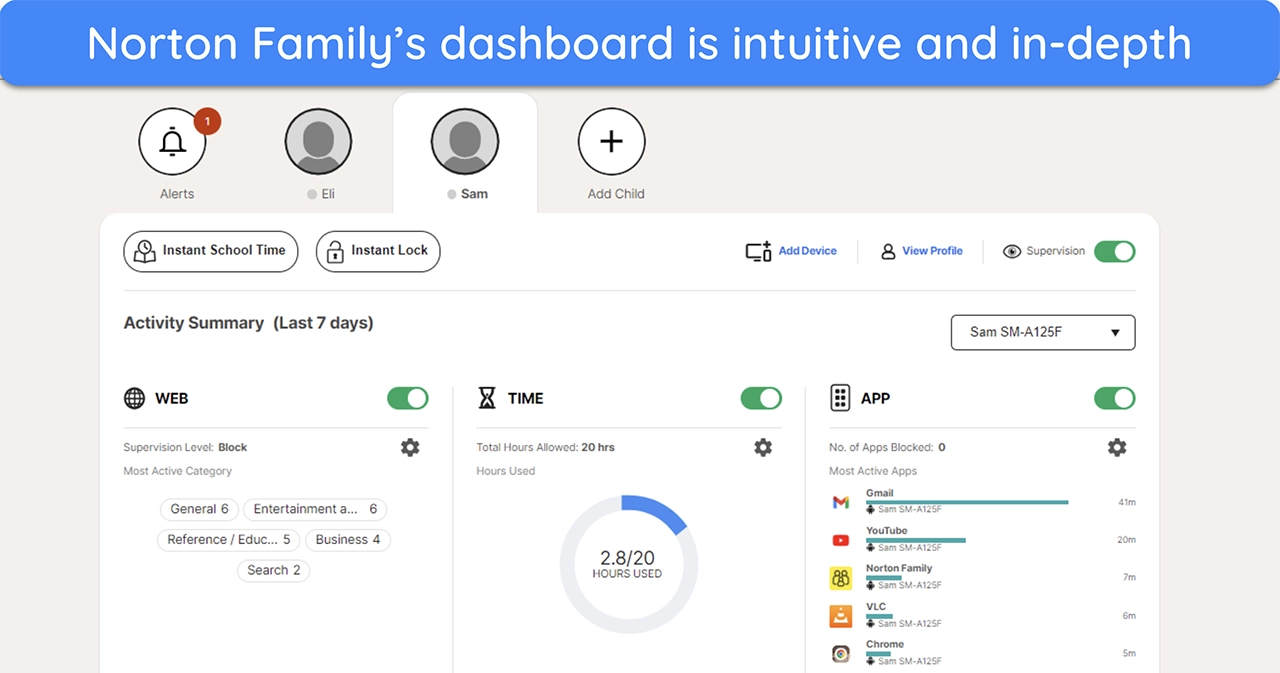
You’ll also get effective web supervision and filtering with Norton. It lets you block unsafe websites by providing a comprehensive list of categories that you can deny with a single click. Plus, there’s a Norton Family browser extension you can install for additional supervision, like tracking search history and video-watching history. There are also other useful features, like:
- Screen time limits — stop your children from overusing their devices.
- Instant lock — restricts your child’s device usage, ensuring they take breaks.
- Access request — lets your child request access to blocked websites or additional screen time, facilitating open communication and flexibility.
Note that Norton Family isn’t the cheapest option, as it costs $49.99/year. However, it’s bundled with Deluxe and higher Norton 360 plans. This is excellent value because it lets you get one of the best antiviruses in 2025 alongside the in-depth parental controls. Whichever option you choose, you can try Norton risk-free for 30-days.
5. Net Nanny — Provides Regular Alerts of Suspicious Online Activity
Key Features:
- Provides alerts whenever minors search for inappropriate content or have unsafe conversations
- Maintains a full history of kids’ search activities
- Allows screen time limiting on childrens’ devices
- Works on Windows 10 and 11
- Has a 14-day return policy
Net Nanny’s alerting function is among the best tools it offers. It regularly monitors your kids’ activities and immediately sends you alerts if they try to open blocked websites, have potentially unsafe conversations, or search for something suspicious online. This ensures you’re always aware of when children may be wandering into dangerous territory online.
Other than the alerts function, Net Nanny includes various useful tools that are important for a Windows-based parental control app, including:
- Screen time limiting — limits how long your children can use their devices in a day.
- Website filtering — blocks unsafe and inappropriate websites.
- Family Feed — provides an overview of your kids’ activities.
Among Net Nanny’s downsides is that its interface looks fairly outdated. Its app doesn’t feel as intuitive as that of top competitors like Qustodio, meaning it may take some time to get used to. However, this isn’t much of an issue once you get the hang of the features and know how to navigate the apps.
Net Nanny provides reasonable value for money at $39.99/year for the cheapest plan. However, this plan only covers 1 device, so you might have to get the more expensive $54.99 or $89.99 subscriptions, depending on how many devices you need to secure. Whichever plan you choose, a 14-day refund policy lets you try Net Nanny risk-free.
Comparison Table: 2025’s Best Parental Controls for Windows
| Lowest Price | Web Supervision | Supported Windows | Free Trial | Money-Back Guarantee | |
|---|---|---|---|---|---|
| Qustodio | $54.95/year | ✔ | 10 and 11 | 31 days | 30 days |
| Mobicip | $35.88/year | ✔ | 7 and higher | 7 days | 30 days |
| Bark | $49/year | ✔ | Chrome and Edge for Windows | 7 days | ✘ |
| Norton Family | $49.99/year | ✔ | 7 SP1 and higher | ✘ | 30 days |
| Net Nanny | $39.99/year | ✔ | 10 and 11 | ✘ | 14 days |
How to Install and Use a Parental Control App on Windows
Installing and using a parental control app is a somewhat lengthy process, as you need to set up the app first and install it on your children’s device later. The steps below provide a detailed breakdown of how to install Qustodio. You can easily follow similar steps for other parental controls as well.
- Subscribe to Qustodio. Access the Qustodio website and choose a subscription that fits your needs.
![Screenshot showing how to subscribe to Qustodio]()
- Log into Qustodio. Access the Qustodio web portal, log into it with your account, and start adding your child.
![Screenshot showing how to start configuring Qustodio]()
- Enter your kid’s details. Enter your child’s information in the Qustodio web portal to add them to your account.
![Screenshot showing how to add a new child to Questodio]()
- Add Qustodio to your kid’s device. Start installing Qustodio on your child’s device after adding them to your account.
![Screenshot of Qustodio asking for installation on the child's device]()
- Download the setup. Download Qustodio’s app for kids from the website.
![Screenshot showing how to download Qustodio's setup for your kid's device]()
- Install Qustodio. Run Qustodio’s setup and follow all the steps to install it on your kid’s device.
![Screenshot showing how to install Qustodio on Windows]()
- Choose the parent account option. Select the “I already have a parent” account option to log into your Qustodio account on the child’s device.
![Screenshot showing Qustodio asking to log into a parent account]()
- Log into Qustodio. Log into the Qustodio app using your parental account details.
![Screenshot showing how to log into a Qustodio parent account]()
- Configure the device. Enter a name for your child’s device and hide Qustodio from view if required.
![Screenshot of Qustodio's configuration of a kid's Windows device]()
- Assign the device. Assign the device to the child it belongs to.
![Screenshot showing how to assign a Windows device to a child added to Qustodio]()
- Complete the setup. Click “Finish” to complete Qustodio’s setup on your child’s device.
![Screenshot showing how to finish Qustodio's setup on Windows]()
- Use Qustodio. Click “Supervise activity” in the web portal after completing the setup to start monitoring your kid’s activity.
![Screenshot showing how to start monitoring your kid's activity using Qustodio]()
Our Methodology for Ranking the Best Parental Control Apps for Windows
I used our extensive testing methodology and ranked the best Windows parental control apps against the following criteria:
- Feature variety. I chose parental controls with extensive feature sets, like web filtering, location tracking, and screen time monitoring.
- Ease of use. I picked apps that are simple to use and configure on your kids’ devices.
- Device compatibility. I found parental controls that can also monitor your childrens’ phones alongside their Windows devices.
- Customer support. I selected apps with helpful customer support that can assist with any issues you face.
- Pricing. I picked parental control apps that offer great value for money.
Parental Controls That Didn’t Meet the Criteria
Microsoft Family Safety
Microsoft’s built-in Family Safety app isn’t as feature-rich as top premium options, which is why it didn’t get a spot on this list. It’s good for basic monitoring capabilities but lacks advanced features you’ll get with the best parental control apps.
mSpy
mSpy has comprehensive monitoring features but is only built for phones, so you can’t use it to monitor and manage your childrens’ activity on their Windows devices.
FAQs on Windows Parental Controls
Are there free parental control programs for Windows?
What features should I look for when installing parental control apps on Windows?
There are some important features to look for when getting a reliable parental control app for Windows, including the following:
- Web filtering blocks access to inappropriate websites.
- Activity monitoring informs you about your child’s online activity.
- Intuitive dashboard provides an easy-to-use way to manage your childrens’ devices.
- Location tracking allows you to monitor where your kids are going.
- Reporting delivers comprehensive reports about summarizing your child’s activities.
Can I use the same parental control app to monitor my child’s phone and Windows computer?
Does Windows have its own parental controls?
Secure Your Kids’ Windows Devices With a Top Parental Control App
Due to the gaps in Microsoft’s built-in parental control, getting a top premium parental control app is essential. Otherwise, you can’t effectively monitor and manage your kids’ activity, and they may access unsafe websites or have dangerous online conversations.
The above apps are all effective for securing your child’s Windows devices. By providing comprehensive monitoring, thorough reporting, and effective screen time limiting, they ensure your children are always protected and never overuse their devices.
While they’re all effective, Qustodio is the #1 parental control for Windows, thanks to its comprehensive variety of features. Plus, it’s also among the easiest to configure and has some of the most intuitive apps. You can try Qustodio risk-free, as it comes with a 31-day free trial and a 30-day money-back guarantee.



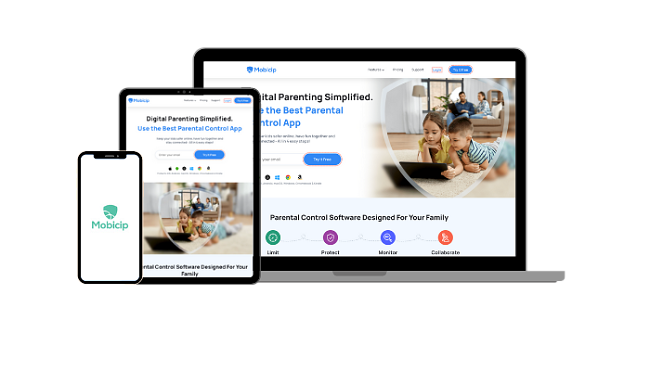
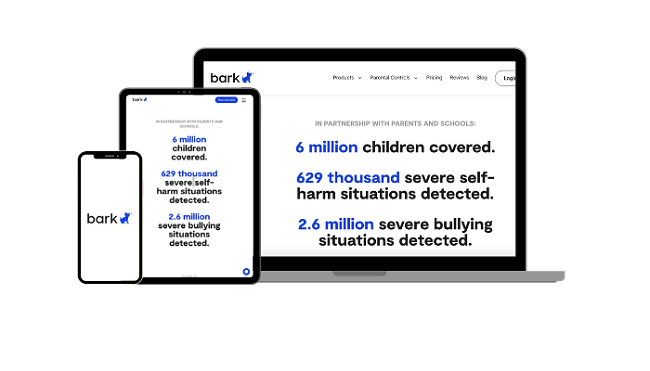
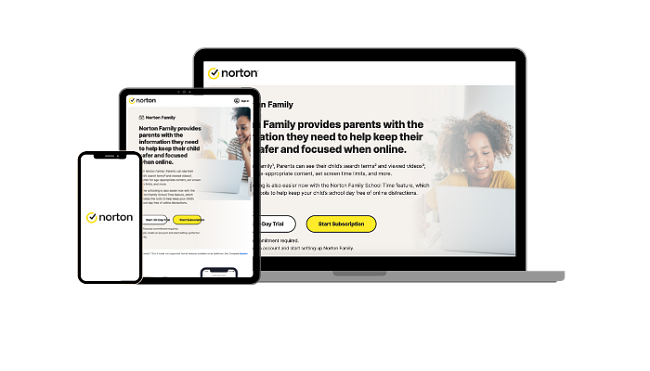
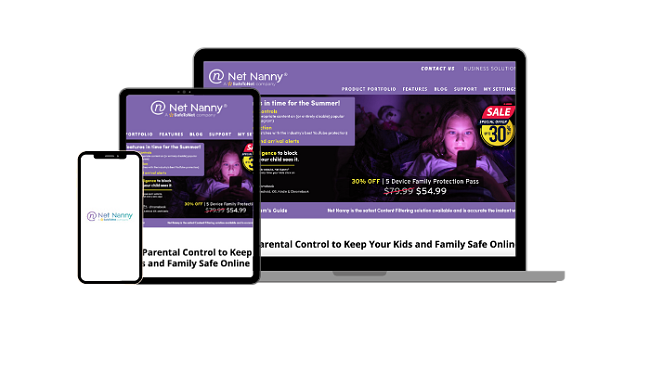
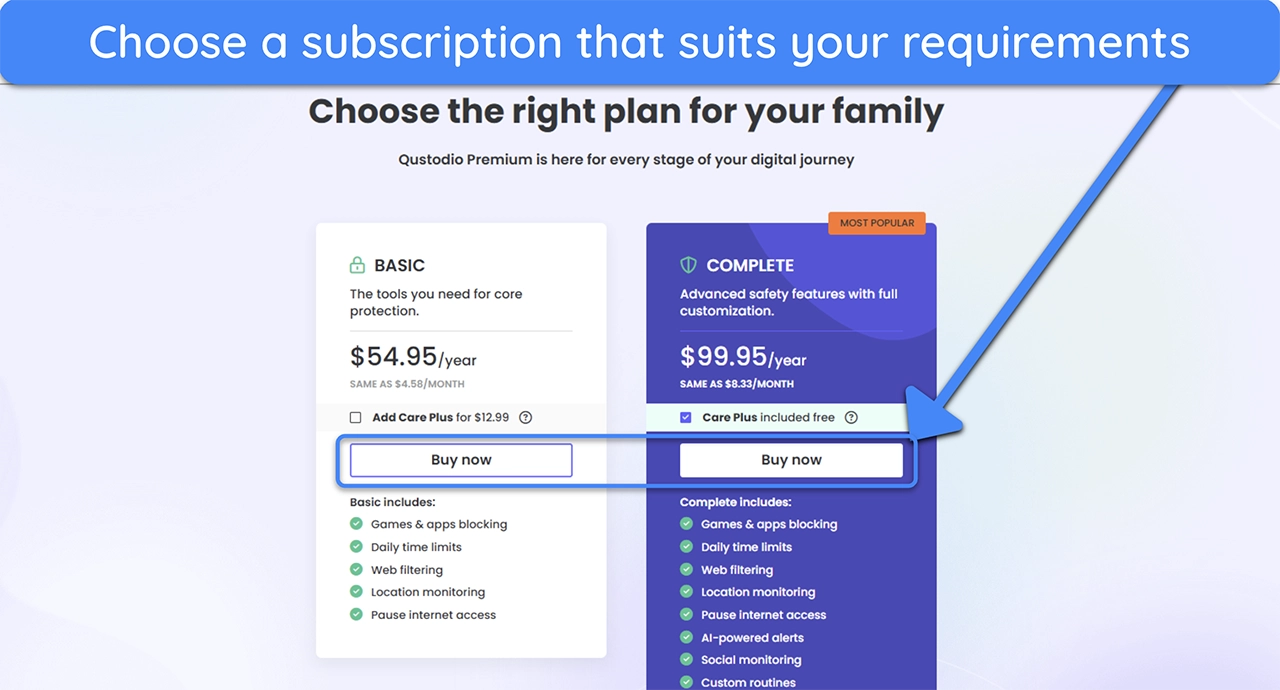
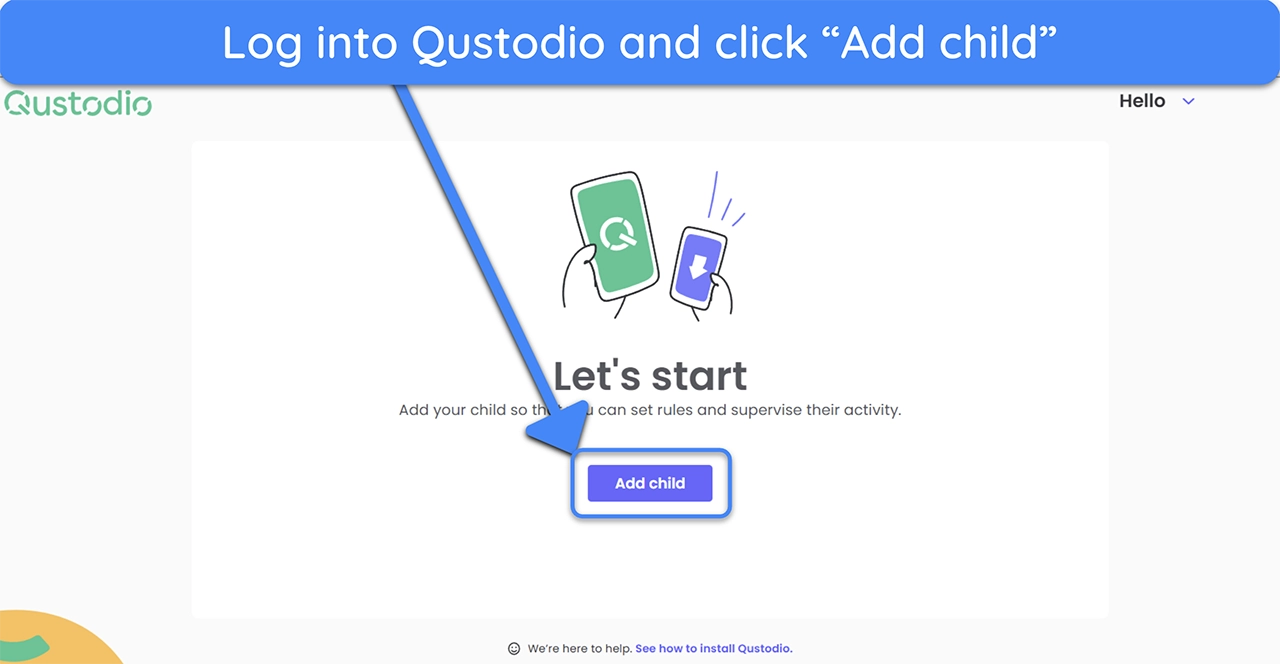
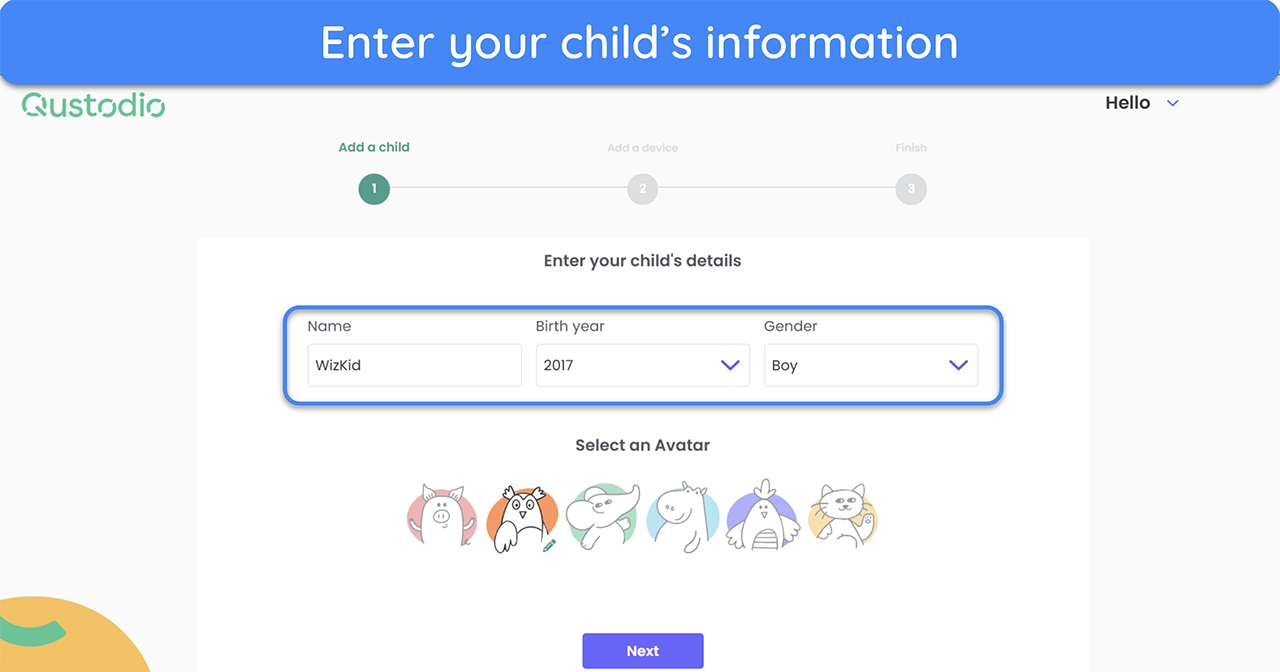
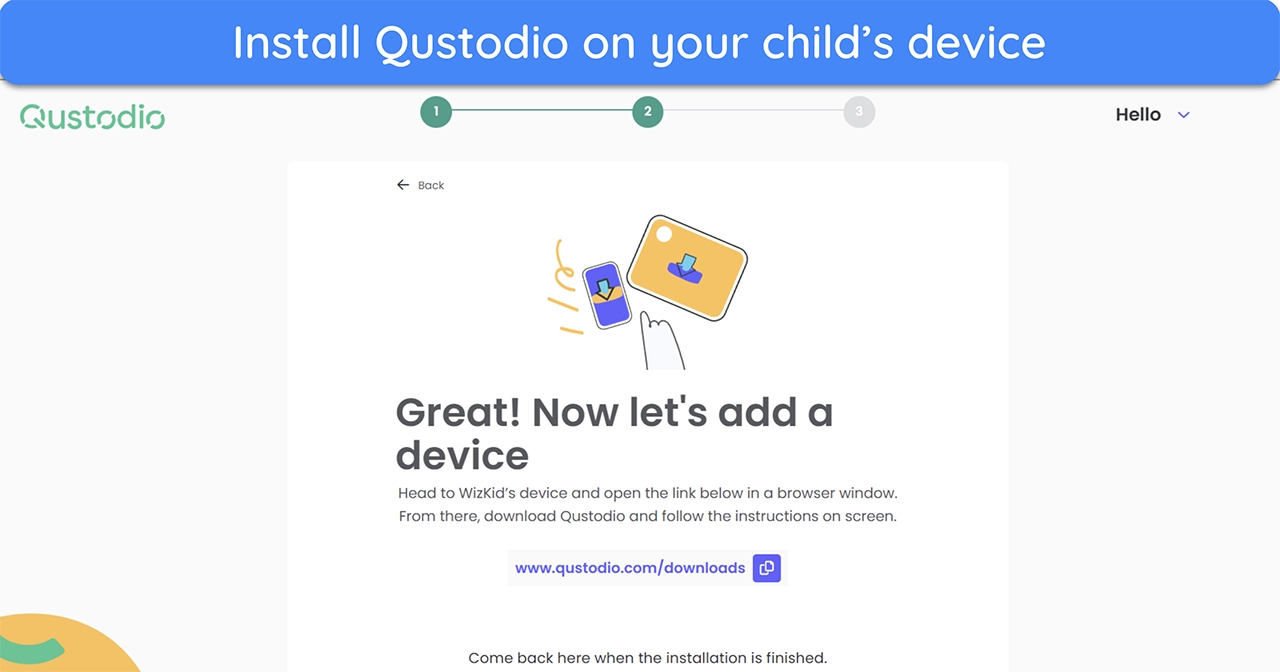
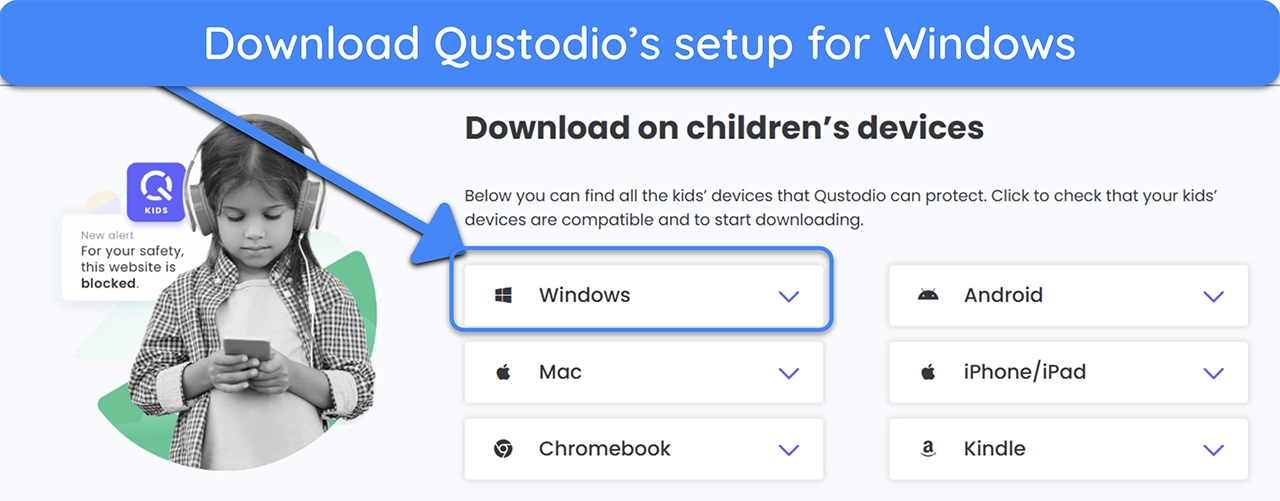

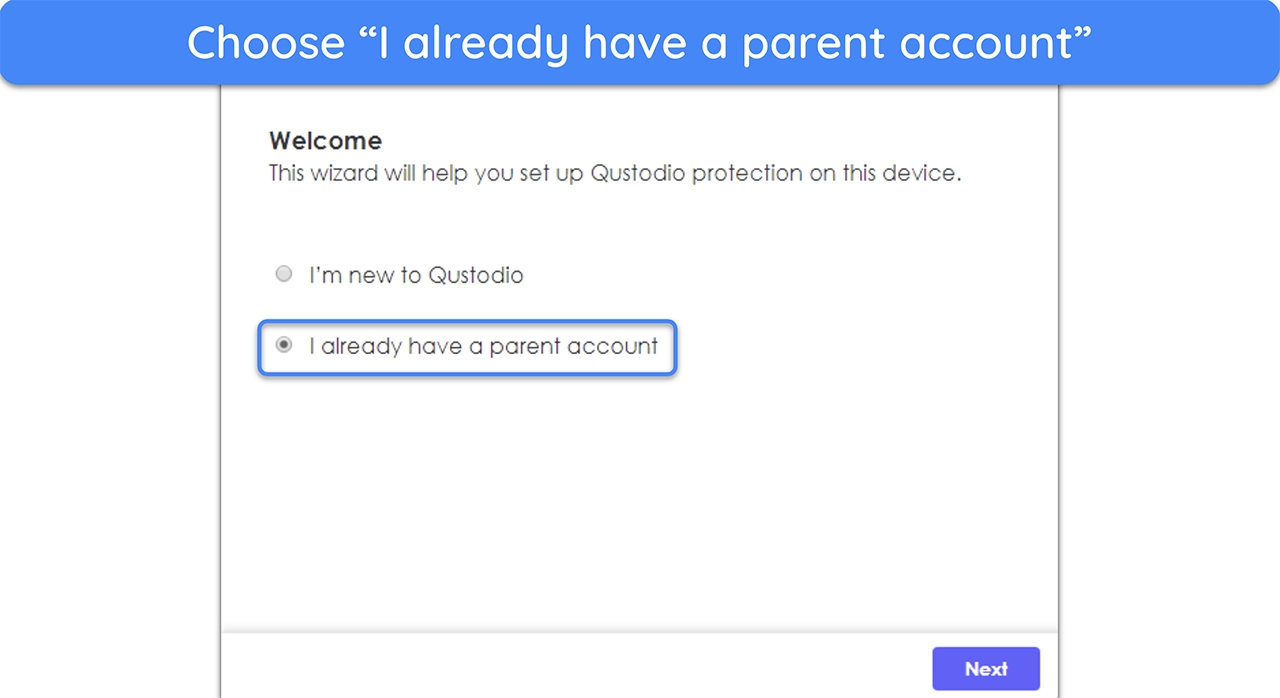
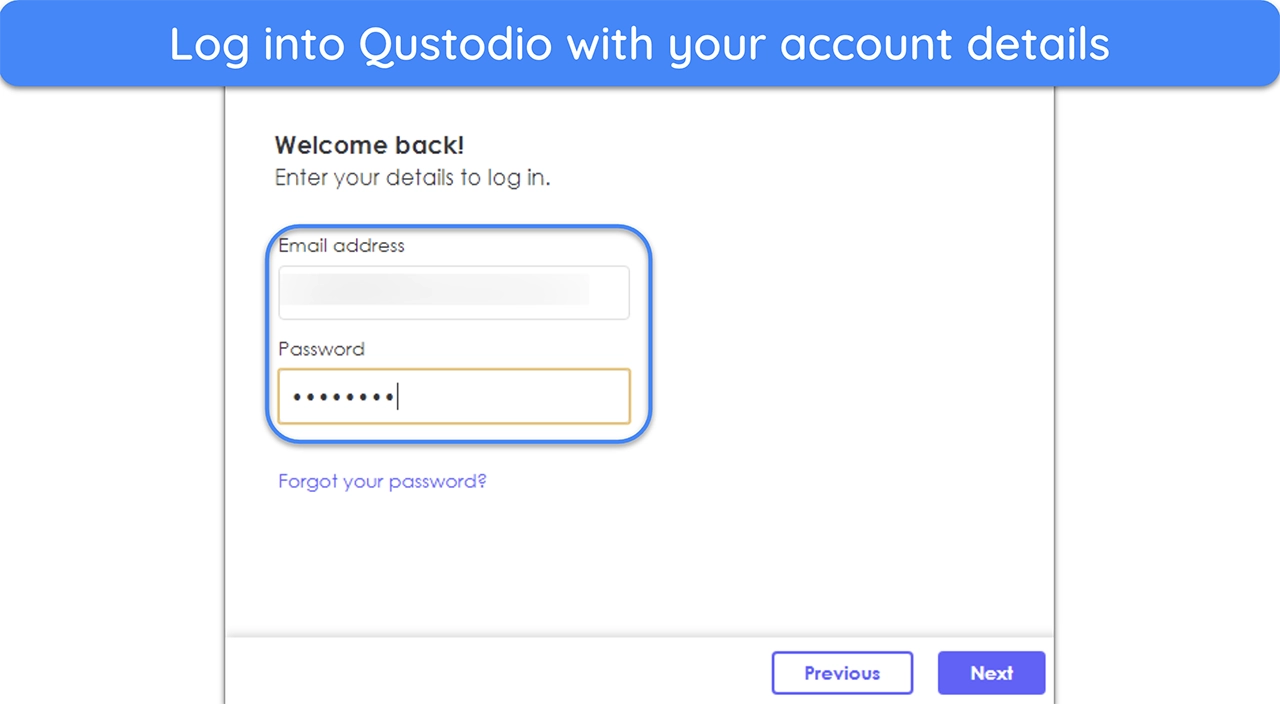
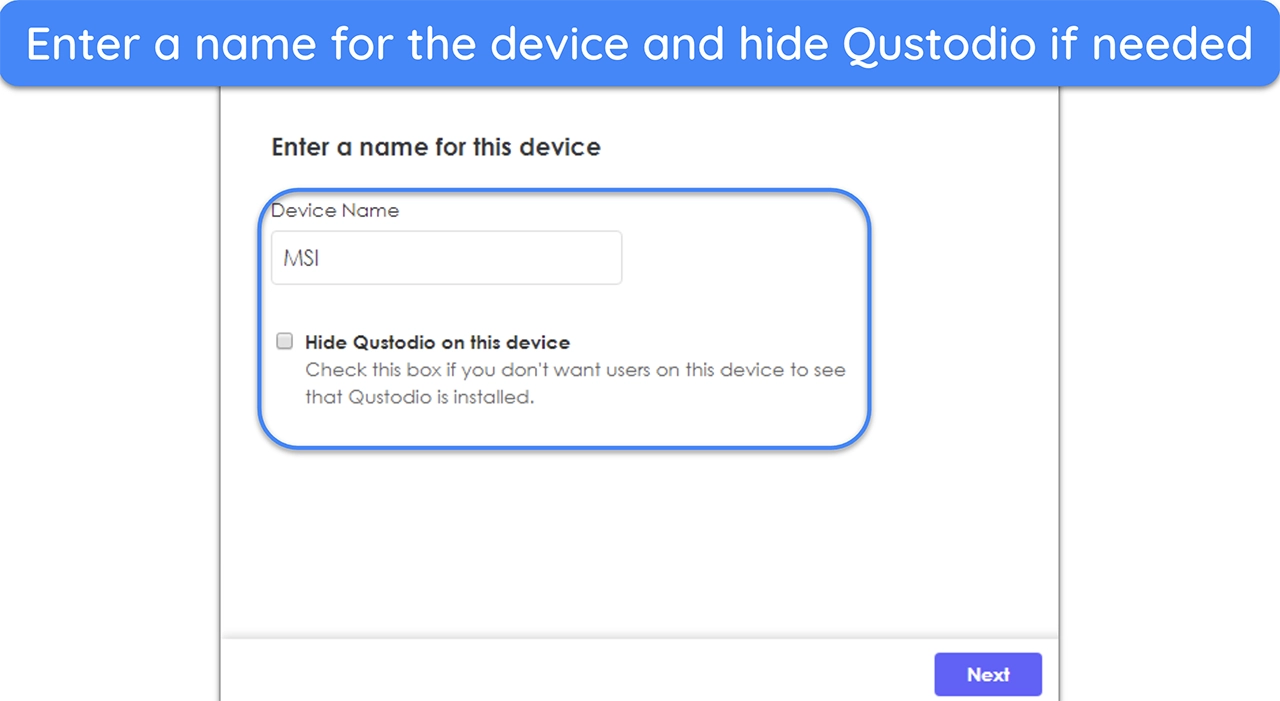
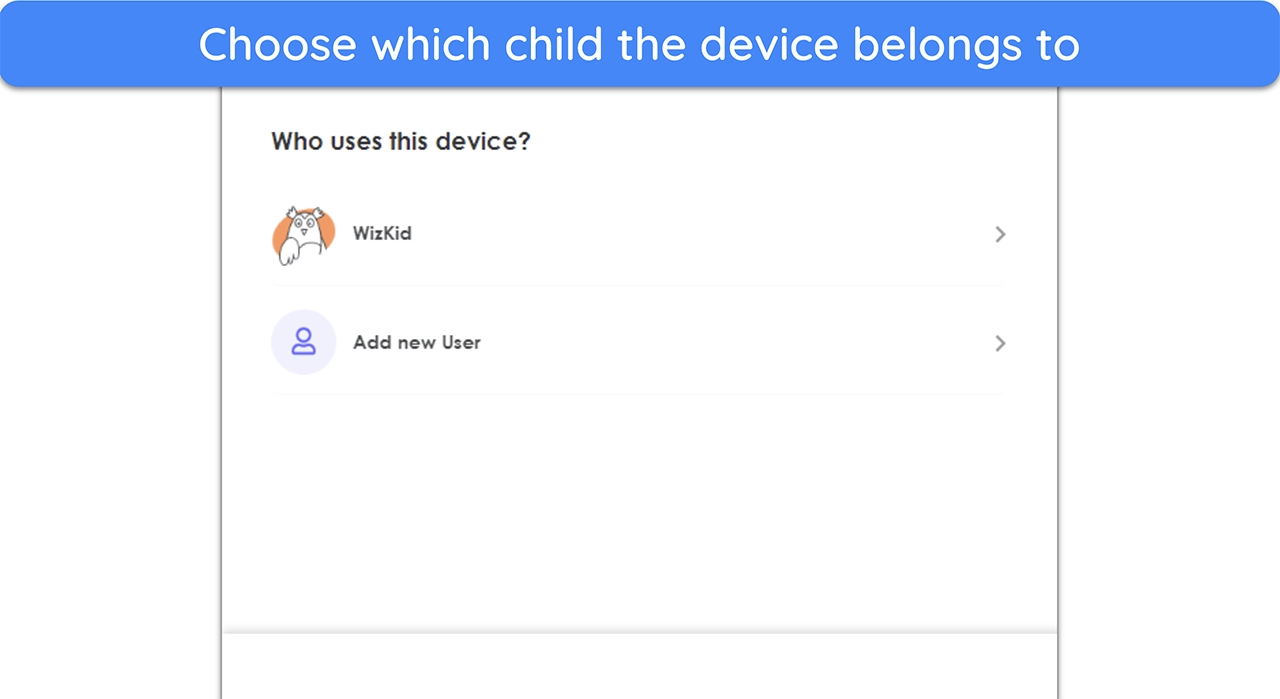
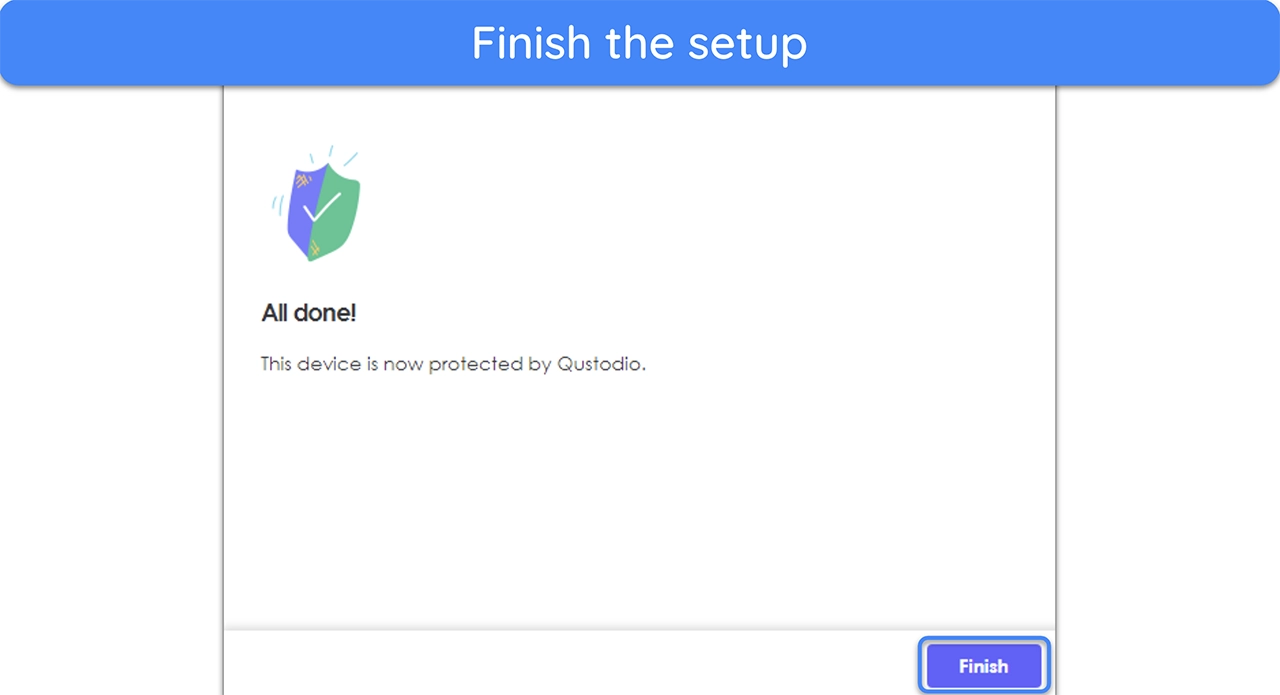
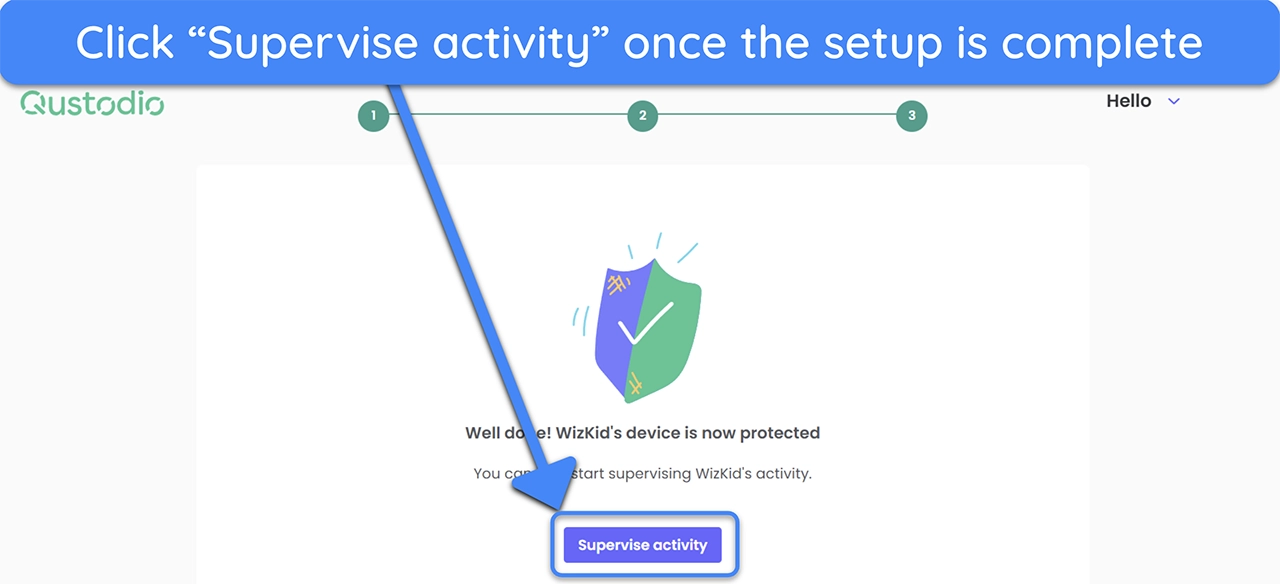




Leave a Comment
Cancel